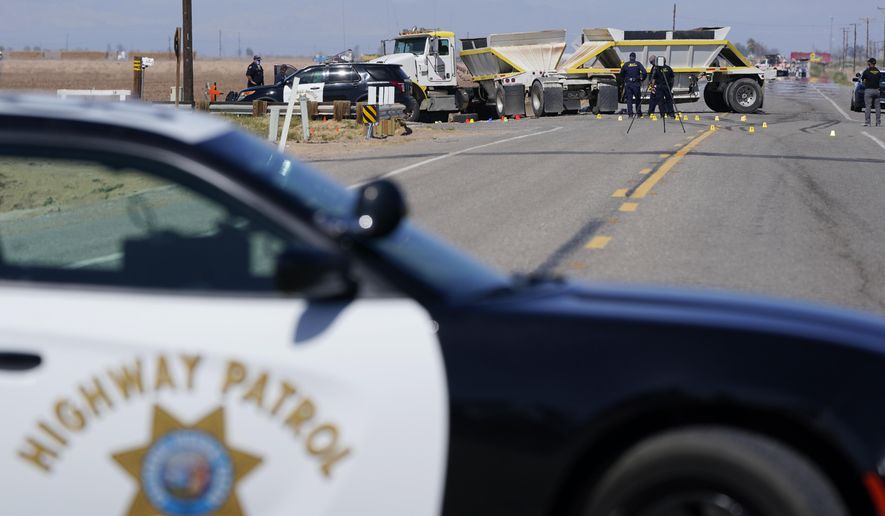Sebastian Gamino-Solis, nabbed this month with five illegal immigrants in his BMW, told a Border Patrol agent that he had responded to an ad seeking drivers while trolling through Facebook.
He needed to find some work, and he exchanged information. Then he got the call: He was to go to a park in Chula Vista, California, and collect the people. He would get $2,300 per person.
He was stopped before he could complete the delivery.
Social media platforms are playing an increasing role in the chaos at the border. Smuggling cartels use social media to urge would-be migrants to make the trip and line up the guides and drivers who shepherd the people across the boundary, keep them in stash houses and drive them deeper into the U.S.
Arizona Gov. Doug Ducey, a Republican, has called on major social media platforms to shut down the ads. He said the government is doing what it can, “but we need your help.”
“Kids are being lured with the promise of quick cash to aid the cartels in their smuggling operations, break traffic laws to evade police, endanger themselves, passengers and innocent occupants of other cars and ultimately jeopardize their future all because they have responded to an ad on social media,” he wrote in a letter to the chiefs of Twitter, TikTok, Snapchat and Meta, which runs Facebook.
The governor acknowledged that the companies have ways for users to flag illegal posts but said “we need stronger action to prevent this activity that is drawing our young people into a life of crime.”
The Times reached out to all four companies Mr. Ducey contacted.
Only Meta responded. It said Facebook tries to stop the messages when it can.
“We prohibit content that offers or assists with human smuggling, invest in technology and people to proactively identify it, and remove it from our platform whenever we find it,” the company said in a statement.
Border law enforcement officials say smuggling cartels are particularly interested in recruiting juveniles to drive, figuring — usually with good reason — that federal authorities won’t go as hard on youths caught smuggling.
Border Patrol agents say drivers as young as 13 are being recruited.
Mr. Ducey said those sorts of stories make it imperative that the social media companies do more to proactively screen for smuggling ads.
“Just as your companies work to protect youth from obscenity and violence on your social media platforms, it’s time to protect them from criminal solicitation as well,” he wrote.
Taking down the ads will also dent the cartels, he said.
The rate for drivers to carry illegal immigrants from the Arizona border to Phoenix can vary from a couple of hundred dollars per trip to $2,000 per person. In Texas, truck drivers can make tens of thousands of dollars for a single load.
Terrence Xavier Jones, arrested this month while carrying 110 illegal immigrants through a Border Patrol checkpoint near Laredo, Texas, told agents he was getting $60,000 for the trip to San Antonio, according to court documents.
Facebook, Snapchat and WhatsApp are the most common social media apps used, according to The Washington Times’ database of smuggling prosecutions. Smugglers also have used TikTok, Telegram and Craigslist.
The Times analyzed federal smuggling prosecutions last year out of Arizona, where migrants were held as witnesses, and found that smartphones and social media apps were used to facilitate the smuggling in nearly 70% of the cases.
Smuggling coordinators would use apps to guide migrants across the border and to pickup locations. The migrants would meet up with drivers, often recruited over social media.
Cartels and those working for them are raking in cash during the border surge.
To cross into Arizona, migrants pay the cartel a “mafia fee” of $1,000 to $2,500 for the crossing alone, according to The Times’ database.
Migrants will then pay more to cover all the people who shepherd them along the way, including drivers who get them from the border deeper into the U.S. Payments of $8,000 to $10,000 are typical for Mexicans. Those from Central America can shell out $16,000 for the trip.
As easy as social media platforms make it for the cartels to smuggle, they also can help the feds make cases against some of their employees.
In Arizona, Isaiah Lorenzo Brinkley was slapped with a 75-month sentence last week for coordinating smuggling runs, including one that ended with a driver evading Border Patrol agents, smashing the vehicle, killing one Colombian adult migrant and severely injuring a child.
Homeland Security Department investigators pored through the dead driver’s Snapchat account and found he had been recruited over by Brinkley.
Brinkley told investigators he made up to $12,000 for each load of migrants he coordinated.
• Stephen Dinan can be reached at sdinan@washingtontimes.com.




Please read our comment policy before commenting.